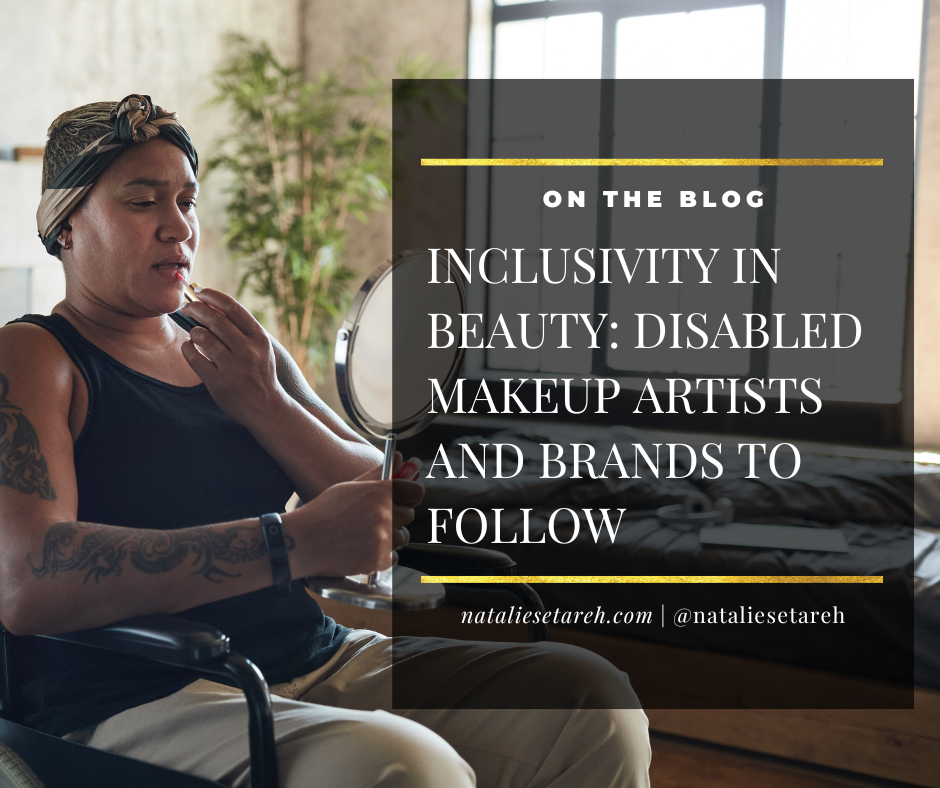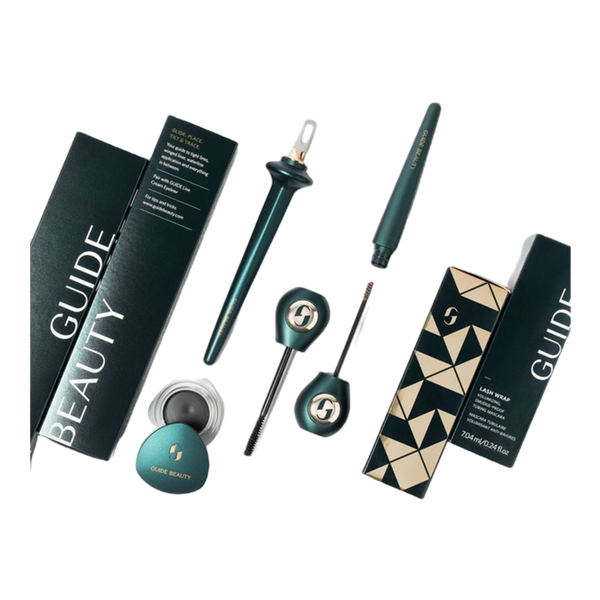My name is Natalie Setareh, and I am a professional makeup artist and beauty coach. My less-is-more, skin-forward approach to makeup education fills a massive void in the beauty industry; an industry that seems to be more focused on consumerism every day.
In addition to teaching people how to shop for and apply makeup in a way that works for them, I’m also passionate about creating beauty content that helps reshape how we engage and participate in the beauty industry. When we invest in brands that align with our values and operate as informed consumers, we consume less (and save more of our hard-earned money), but we also feel more confident with how we present ourselves and show up in the world.
I pride myself in creating a safe space for makeup learners of all abilities, ages, genders, and ethnicities. When I say makeup is for everyone, I mean it. And that’s why I wanted to highlight a special group of makeup artists and beauty brands that are disabled-owned and/or driven to cater to people of all abilities.
Inclusivity Beyond Skin Tone
In the last few years, you may have noticed that makeup brands are being held more accountable when it comes to inclusivity. Namely, in terms of how they cater to a range of skin tones. And while this accountability is necessary, the beauty industry still has a long way to go to cater to disabled people. Traditional (and Western) beauty standards often exclude individuals with disabilities, perpetuating harmful misconceptions about their appearance and worthiness.
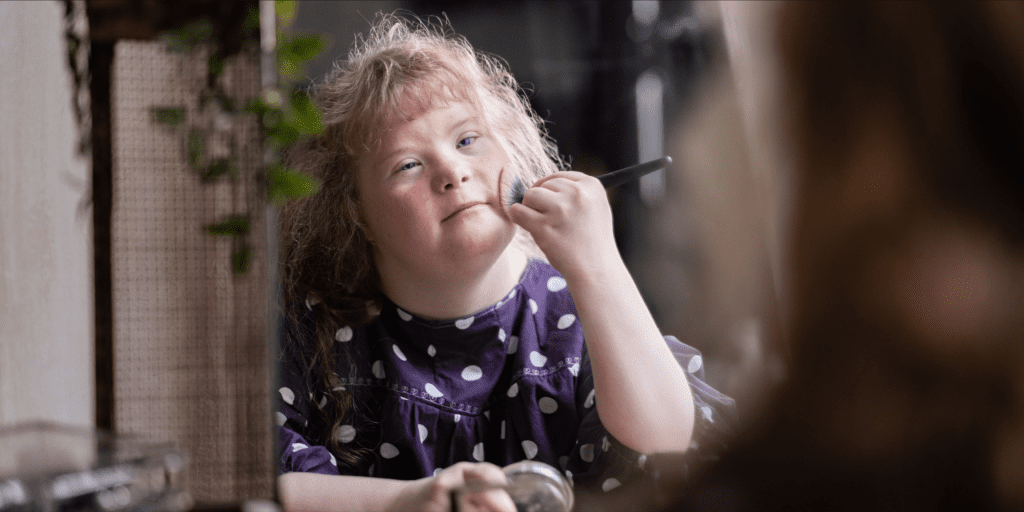
Disability pride is a vital aspect of discussions surrounding beauty, skincare, and makeup. It serves to challenge the damaging stereotype that individuals with disabilities are somehow less beautiful or worthy. By embracing disability pride (beyond the obligatory post for disability pride month), we actively promote the inclusion of people with disabilities in every aspect of the beauty industry.
In this post, I wanted to give you a peek into the beauty industry through the lens of disability. I’ll introduce you to some remarkable makeup artists and beauty content creators leading the charge in making the beauty industry more inclusive and accessible for individuals of all abilities.
Seen and Unseen Disability In the Beauty Industry
Disability isn’t a distant reality. It can affect anyone, at any point in life.
Whether it’s visible, like using a wheelchair, or non-visible, like chronic pain or limited dexterity, disability is a spectrum we all share a connection with. As we age, for example, our eyesight might weaken, or our grip strength might diminish. These changes, while natural, can create new limitations.
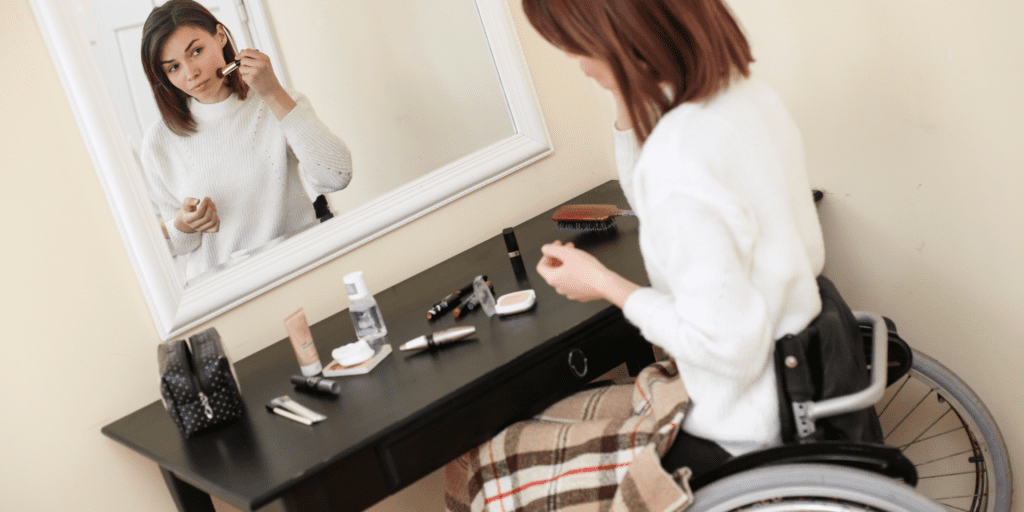
This is where accessibility comes in. Accessibility ensures that beauty products and experiences are designed to be usable by everyone, regardless of age or ability. Think of it like universal design – features that benefit everyone, not just those with disabilities.
Imagine trying to apply mascara with shaky hands, or struggling to open a jar of cream with limited grip. Accessibility features like wider brush handles, easy-twist lids, or voice-activated applicators (like L’Oreal’s HAPTA device) can make a world of difference.
Room for Improvement
Even if we haven’t experienced disability ourselves, chances are we know someone who has. By embracing accessibility, we’re creating a more inclusive beauty space for everyone – our future selves, our aging parents, and countless others who simply want to enjoy the experience of using beauty products.
However, only 4 percent of beauty and personal care brands create products that cater to physical disabilities, Procter & Gamble found in 2019 research. For beauty brands, money is on the table. The total disposable income of consumers with disabilities tops $8 trillion per year in the U.S. alone, according to Accenture’s 2018 study. Consumers with disabilities also have stronger brand loyalty: “I buy repeat products a lot because I can go into a shop or online independently and find my shade,” says Lucy Edwards, a makeup artist and broadcaster who was diagnosed with incontinentia pigmenti, a genetic condition that caused her to go totally blind at 17.
While these numbers may seem disheartening, awareness of the many types of diversity is increasing. I know I’m seeing a lot of innovation to make beauty products more accessible for those with disabilities. This includes things like:
- Easy-to-Open Packaging
- Large Text on Labels
- Fragrance-Free Products
- Hypoallergenic Products
- Cruelty-Free Products
- Pump Style Bottles
- QR Codes
- Accessible Websites (Alt Text, Audio Tools, etc.)
Of course, I want to see way more than 4 percent of brands catering to people with physical disabilities, but I do think things are headed in the right direction. The more disabled makeup artists, brand founders, models, and influencers we see, the more the “big brands” will shift their strategies, too. It is sometimes a slow process, but always a worthwhile one.
Disabled Beauty Brand Founders & Products
As we all know, representation matters so much in the overall conversation about inclusivity. Just like we want to see people of color in CEO-level positions, we want to see thought leaders and brand developers with disabilities in the makeup industry.
Here are just some of the people that I am watching and following:
Founder: Trishna Daswaney
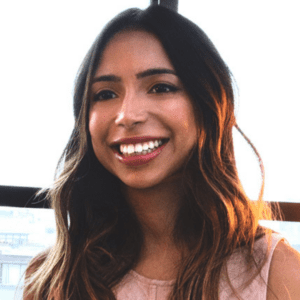
Brand: Kohl Kreatives
About: Kohl Kreatives is a makeup brand founded by Trishna Daswaney, who has a rare genetic condition called Apert Syndrome that affects her mobility and dexterity. The brand offers makeup tools and products designed for people with limited hand mobility, such as ergonomic makeup brushes with wider handles for easier grip.
Founder: Terri Bryant
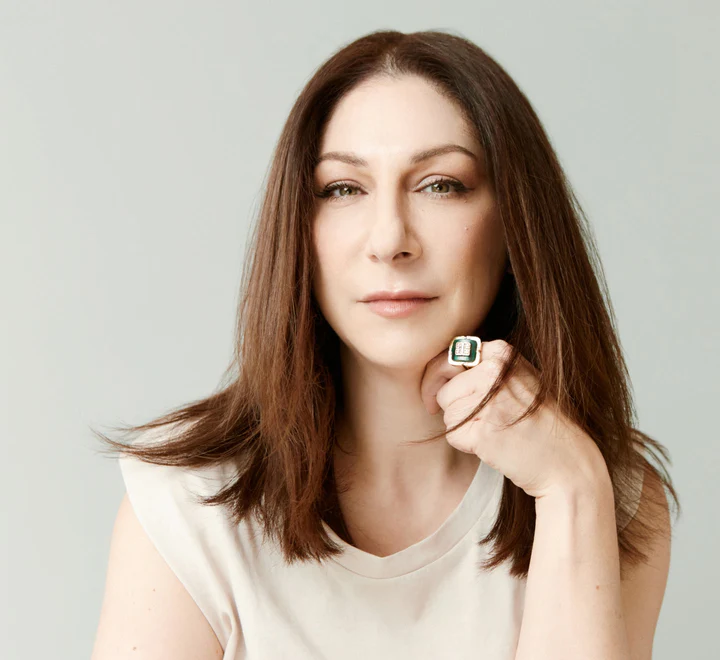
Brand: Guide Beauty
About: Guide Beauty is an award-winning makeup brand founded by Terri Bryant. At the height of her career, Terri lost dexterity in her hand and struggled to apply her makeup. Eventually, she received a Parkinson’s diagnosis. But that didn’t stop her from chasing her dream. In fact, she doubled down on her life-long love of makeup, and she set out to create a better, more inclusive line of products.
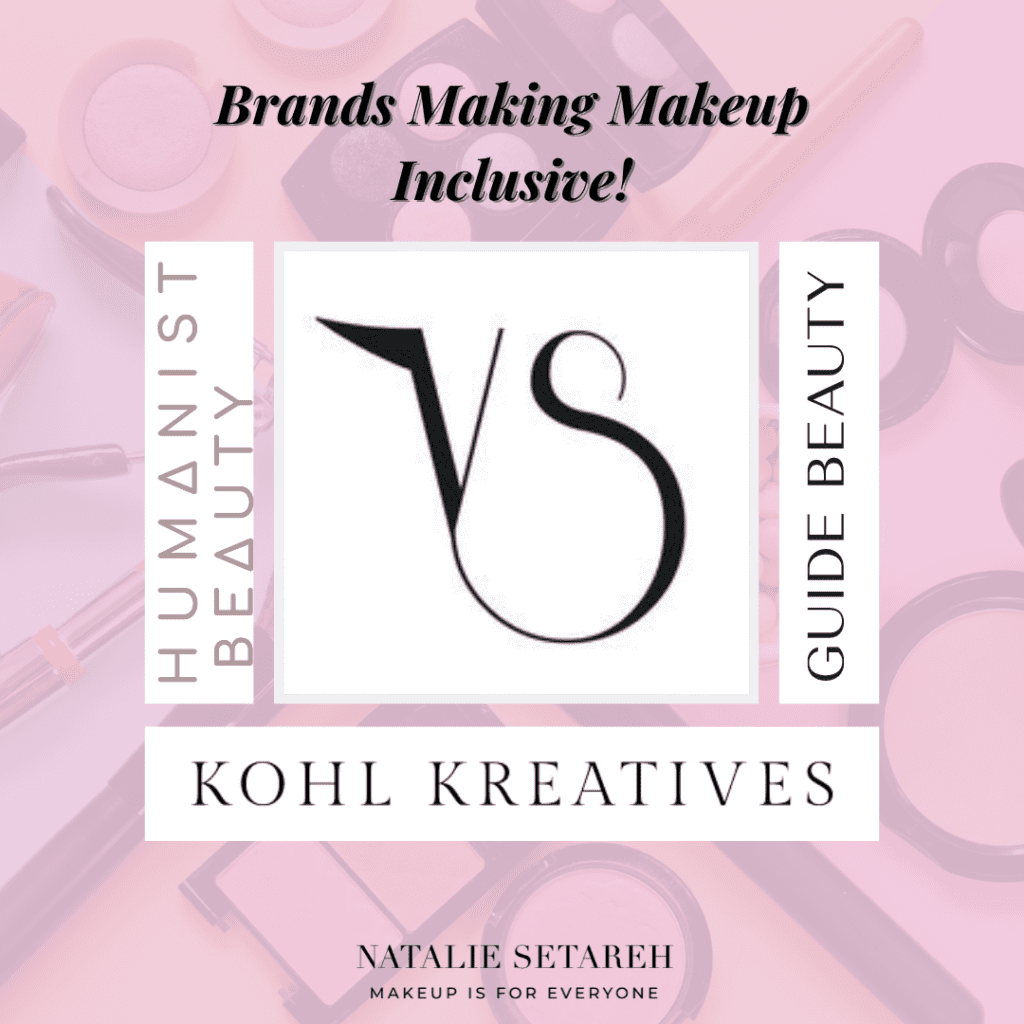
Founder: Veronica Lorenz
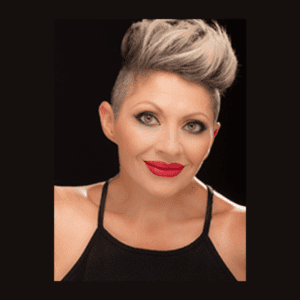
Brand: The Vamp Stamp
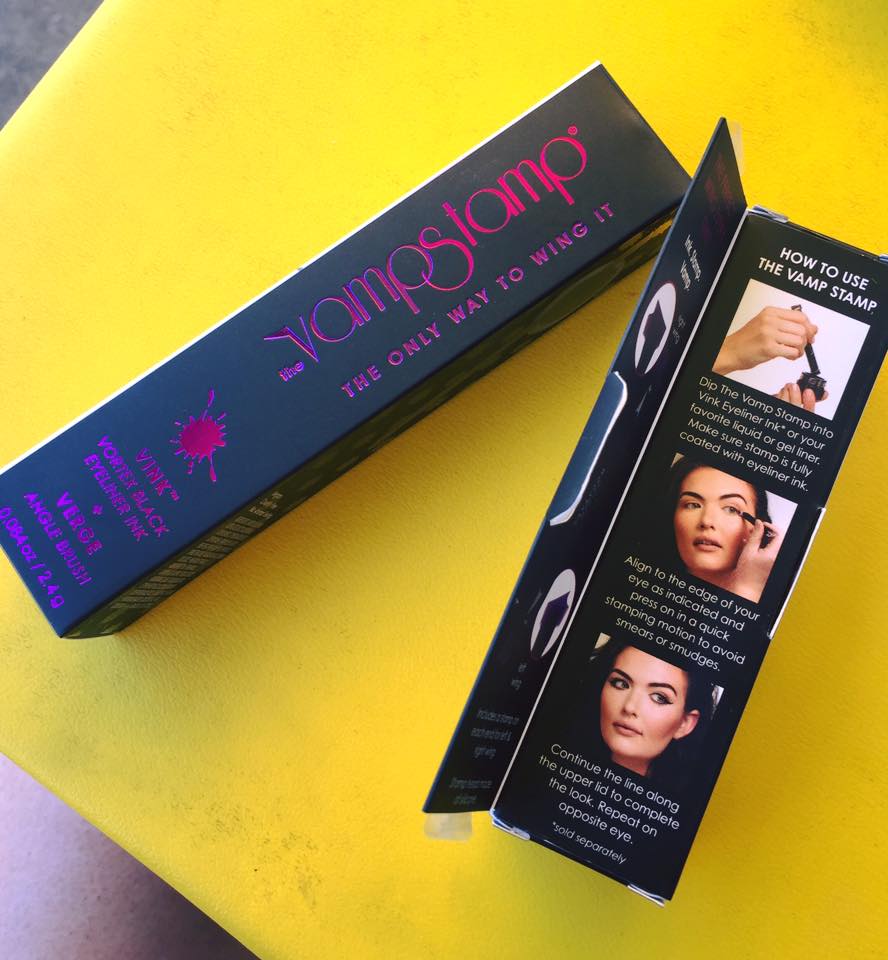
About: Veronica Lorenz is a makeup artist who created The Vamp Stamp, a patented eyeliner stamp designed for people with limited dexterity or mobility. The stamp allows for easy and precise eyeliner application. The Vamp Stamp® includes a sleek stamp designed to hold like a pencil and a formulated VINK™ eyeliner ink. Recognizing this as another way to put her artistry in the hands of the consumer, Veronica patented her innovation and decided to take The Vamp Stamp® to market.
Founder: Jennifer Norman
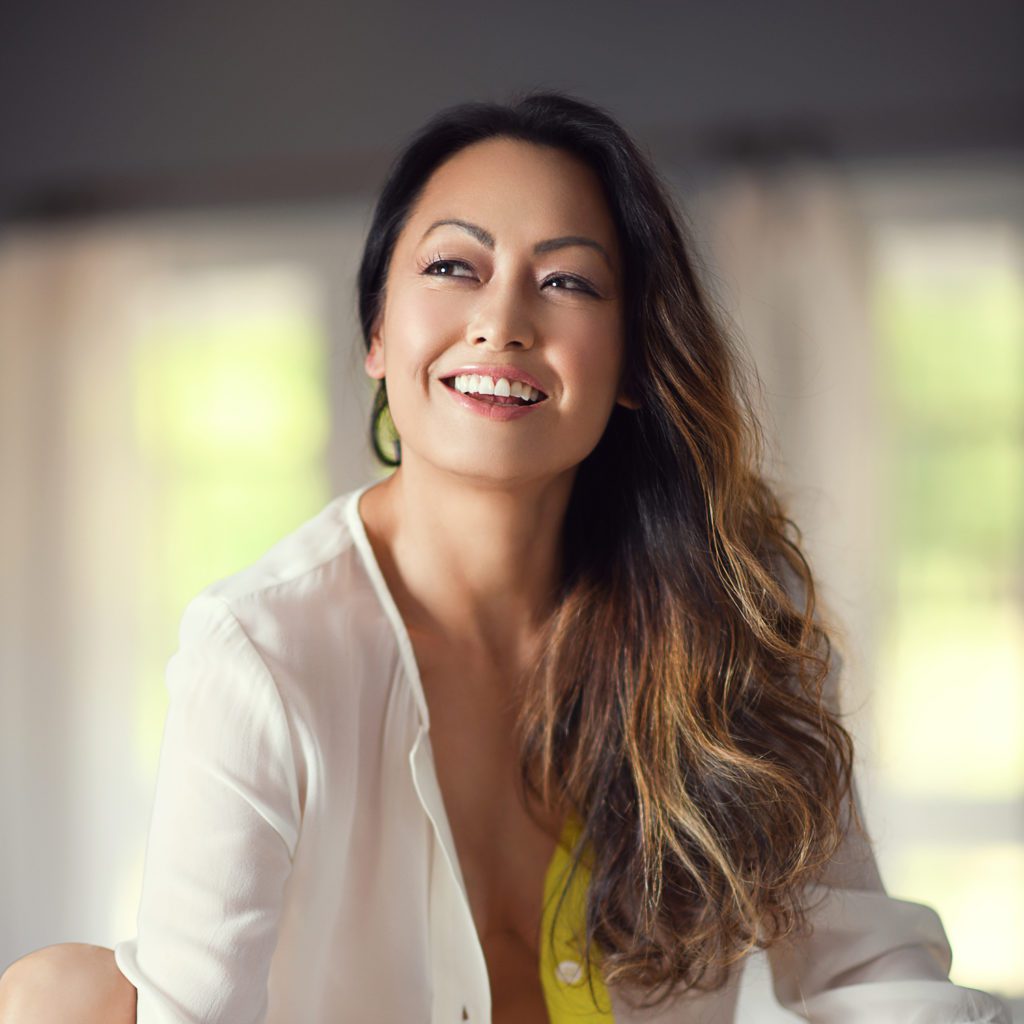
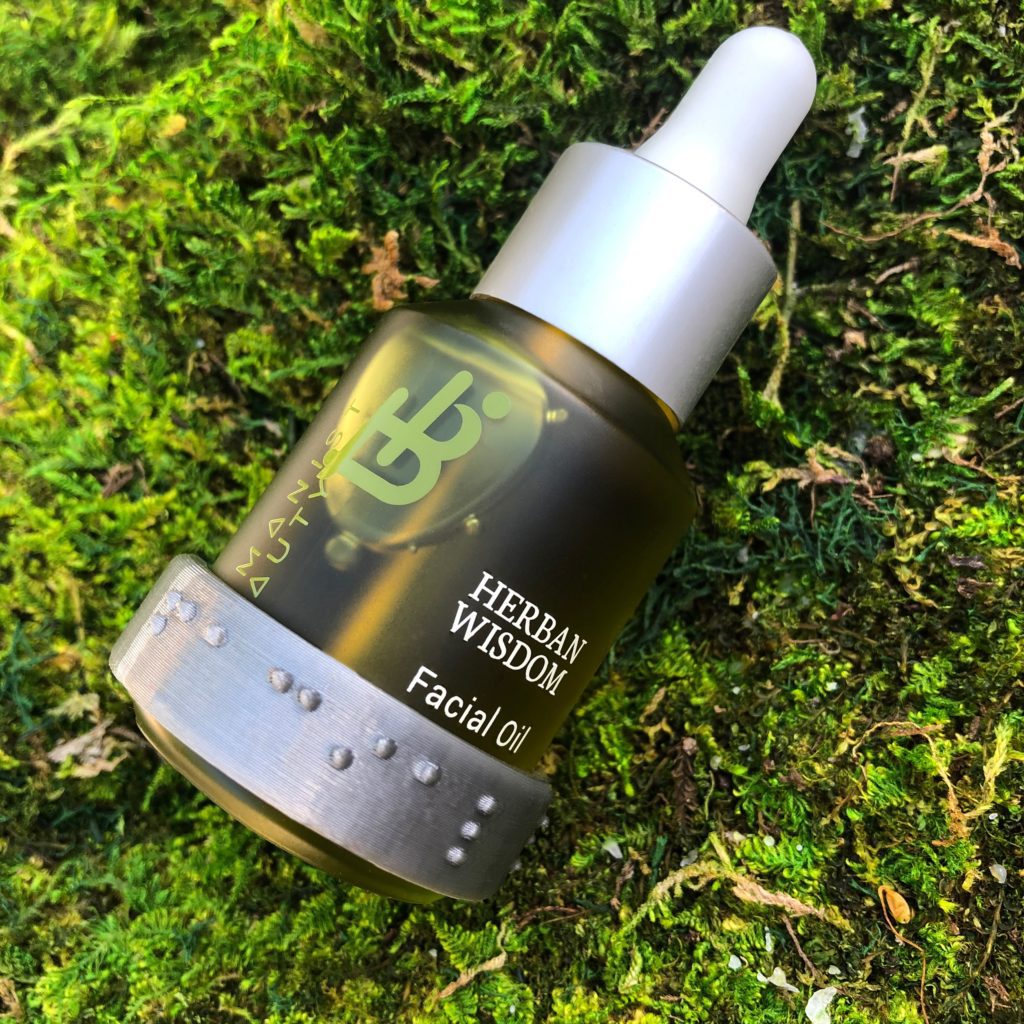
About: Humanist Beauty is a makeup brand founded by Jennifer Norman. I had the pleasure of interviewing her on my podcast. Check out her interview here >
She has a son who was born with a serious genetic disorder, and watching him try to make friends on the playground taught her a lot about living with a disability. She made it her mission to show people they are beautiful and complete, just the way they are. With her products, she puts inclusivity first. Everything is accessible for everyone – from the website to the products that come with a compostable and recyclable 3D printed ring with braille.
Beauty Products Catering to People with Disabilities
In addition to these wave-makers in the beauty industry, some brands are doing a little bit more to cater to people living with a disability. These are brands that we should try to support if we can. Our purchases, endorsements, and positive reviews send a message that we want to see even more, and that’s pretty powerful!
Brand: Meloway
Meloway is a makeup brand that offers products with braille labels and easy-to-open packaging, catering to people with visual impairments. Their popular lipstick has no cap, which makes it easier to use. You simply twist and go without having to keep track of a cap! This is an example of an easy innovation that doesn’t impact the quality of the product or packaging at all but makes the product so much easier for people with visual or mobility limitations.
Brand: VictoriaLand Beauty
Victorialand Beauty makes products that not only look great, but they’re easy for people with visual impairments to use. After her son was born with a rare hereditary disorder that impacted his vision, founder Victoria realized how easy it would be to create more inclusive products.
On her website, she says, “People who are visually impaired crave independence just like everyone else, and with today’s technology and resources, it should be a standard practice that products are packaged in a way that makes them accessible for all.” I agree with this!
Disabled Makeup Artists, Models, and Influencers
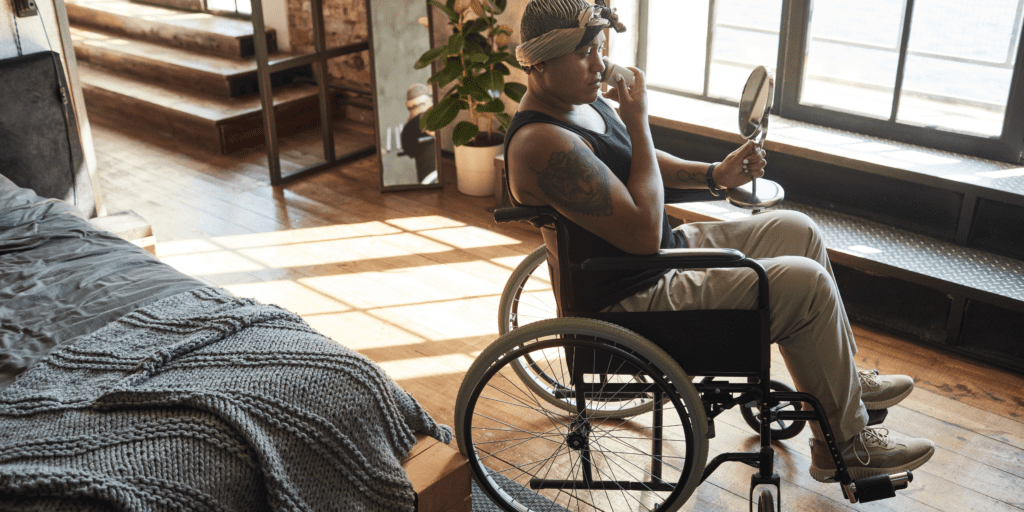
Disabled makeup artists, models, and social media influencers also play a big part in advocating for inclusivity and accessibility in the beauty industry. Their efforts highlight the importance of representation and advocate for more diverse beauty standards.
For reference, Madeline Stuart (@madelinesmodelling_) has Down Syndrome and is an Australian model and makeup artist known for glamorous looks. She’s pushing boundaries and paving the way for other differently abled people to express themselves and feel represented in the beauty industry!
View this post on Instagram
As Always, Vote with Your Dollars!
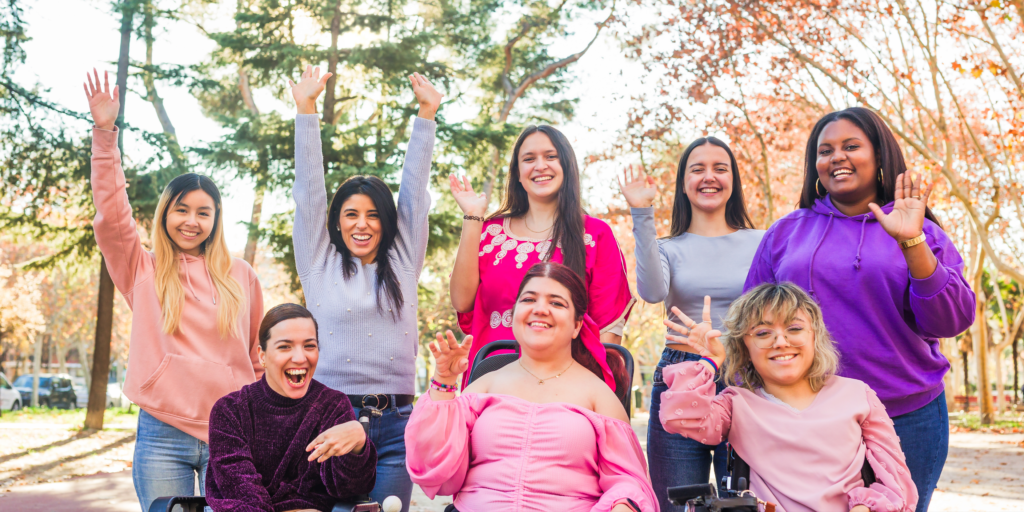
The beauty industry is making strides toward inclusivity, but we need to do more to fully embrace and cater to people with disabilities. As consumers, our choices matter. When we purchase accessible beauty products and support inclusive brands, we send a powerful message: everyone deserves to feel beautiful and worthy! By supporting disabled makeup artists, brands, and creators, we can help push the industry towards more meaningful change and show that makeup really is for everyone.
Did I miss a brand? An account? Please sent me an email at natalie@nataliesetareh.com and I’ll get that added as soon as possible.!
Beauty is about perception, not about make-up. I think the beginning of all beauty is knowing and liking oneself. You can't put on make-up, or dress yourself, or do you hair with any sort of fun or joy if you're doing it from a position of correction.
kevyn aucoin

